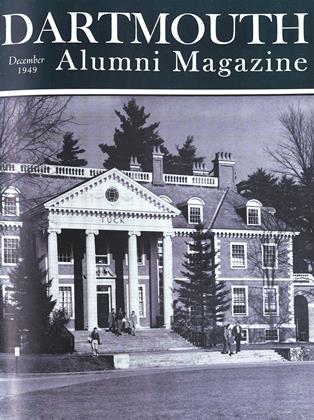The encouraging extent to which the students are willing to work out their own solutions of campus problems—perhaps the most significant development here during the past month—was demonstrated in the poll by which Dartmouth undergraduates made known their overwhelming opposition to racial or religious restrictions in fraternity charters. A detailed description and analysis of this expression of student opinion appears in The Undergraduate Chair in this issue.
The poll, conducted on the night of November 1 through the joint efforts of The Dartmouth, WBDS, the Dartmouth Christian Union, the Human Rights Society and the Dartmouth chapter of the National Student Association, was remarkable for the high percentage of men covered—2,359 out a student body of approximately 2,900. The results were 9 to 2 against the restrictive clauses now. operative in the charters of about half of the fraternities on the Dartmouth campus.
A few days after the poll had been taken, resulting in widespread newspaper reports on the vote, it became known that on October 26 the Dartmouth Interfraternity Council had endorsed a recommendation by the Northeastern Regional Interfraternity Conference that discrimination against students on the basis of race, creed or color be eliminated from all national fraternity constitutions.
In welcoming these expressions of student opinion, President Dickey referred to his own views stated during the past two or three years before alumni groups and printed in the booklet Fraternities atDartmouth. One sentence in the President's statement, also covered in this month's Undergraduate Chair, seems to us to be all-important: "This College neither teaches nor practices religious or racial prejudice and I do not believe that it can for long permit certain national fraternities through their charter provisions or national policies to impose prejudice on Dartmouth men in the free selection of their fraternal associates."
Much has appeared in print about the banning at Amherst of national fraternities with restrictive clauses in their charters. This is being done by administrativfiat. At Dartmouth the administration shares in the campus belief that the students can better take the initiative in working out the solution to this problem. The forthrightness with which the Dartmouth undergraduates have thus far taken up this responsibility is deserving of unstinted praise.
 View Full Issue
View Full Issue
More From This Issue
-
 Article
ArticleOUR GREATEST ISSUE
December 1949 By BRUCE W. KNIGHT -
 Article
ArticleNew Development Council Formed
December 1949 -
 Class Notes
Class Notes1923
December 1949 By TRUMAN T. METZEL, COLIN C. STEWART, JULIUS A. RIPPEL -
 Class Notes
Class Notes1918
December 1949 By ERNEST H. EARLEY, DONALD L. BARR, DAVID L. GARRATT -
 Class Notes
Class Notes1943
December 1949 By ELMER G. STEVENS JR., STANTON E. PRIDDY -
 Article
ArticleIt's An Old Spanish Custom of Speech
December 1949 By CHARLES L. YOUMANS '20












